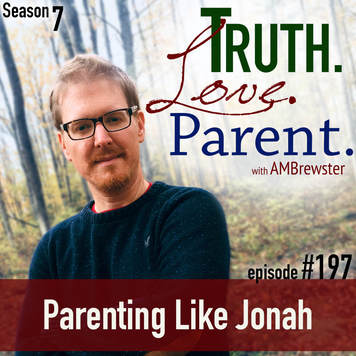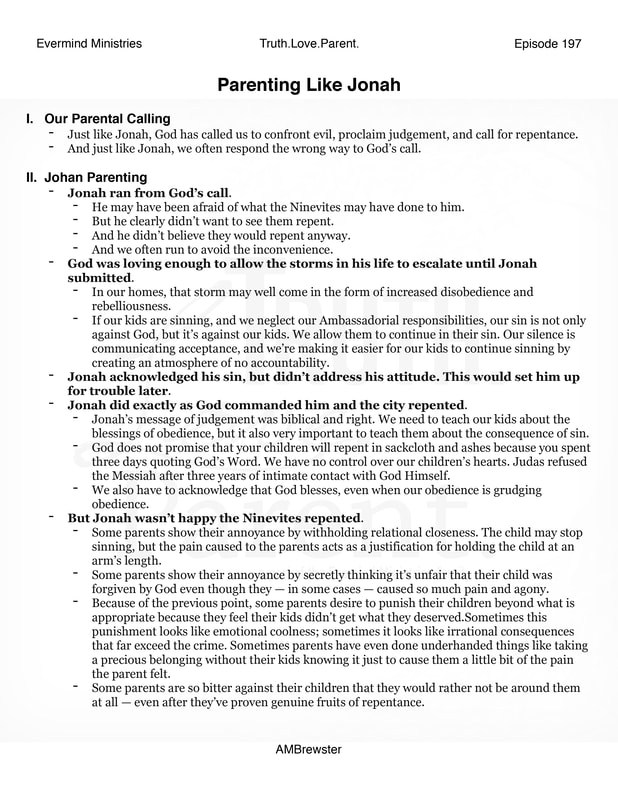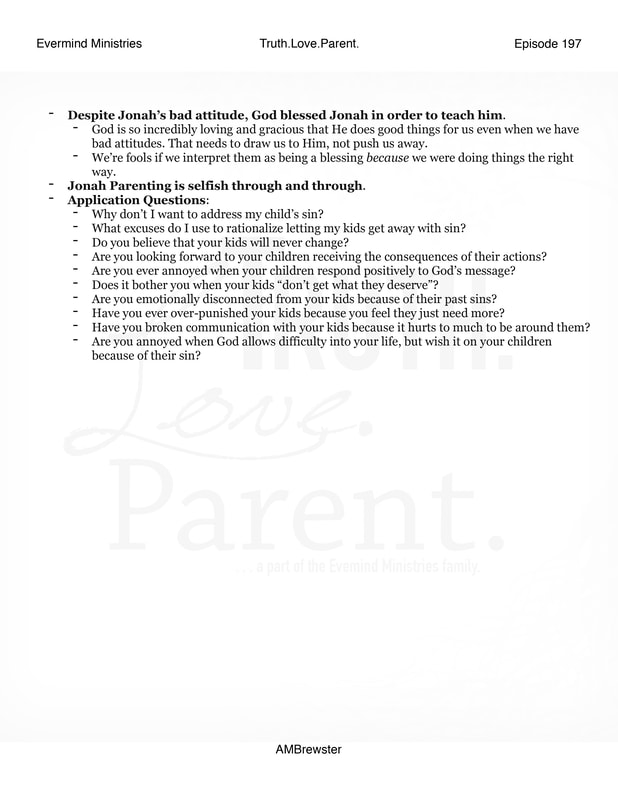 How is Jonah a good example of bad parenting? Join AMBrewster as he looks at Jonah’s life through the lens of modern families and helps Christian parents escape the consequences Jonah suffered. Check out 5 Ways to Support TLP. Click here for our free Parenting Course! Like us on Facebook. Follow us on Twitter. Follow AMBrewster on Twitter. Follow us on Pinterest. Subscribe on YouTube. Need some help? Write to us at [email protected]. Click "Read More" for today’s Episode Notes and Transcript. Episode NotesTo download this document, please right-click and select "Save Image As." TranscriptIntroductionI’m so glad you’re joining us today. I want to start by welcoming a new crew of listeners from the Dallas area! I know a lot of you are curious about how it went when I was there two weeks ago, so my plan is to give everyone a recap of our first TLP Meetup in Dallas and discuss “Creating Community” on our next episode. Still, I just wanted to say, “Hi,” to all the amazing families I met while down there and welcome you to the TLP Family. In the past, we’ve talked about Ambassador Parenting, Evangelism Parenting, Peaceful Parenting, and Parenting like the Holy Spirit. But today we’re going to talk about “Parenting like Jonah.” Now, most of you are going to wonder how that could be a good thing, and I’m going to tell you, it’s not a good thing. But that doesn’t mean we don’t do it. And I want to open God’s Word today to learn how we can break the bad habit of Jonah Parenting. So, let’s jump right in. TopicAs the book of Jonah opens we find God commanding Jonah to “go to Nineveh, that great city, and call out against it, for their evil has come up before me.” Many of us have the same call on our lives. No, we’re not called to go to Nineveh, but we are called to speak out against the evil in the life of our families. We talked about that in the Family Worship series we just concluded. And we know what happened with Jonah. He ran in the opposite direction. His goal was to get as far away from his call as possible. Now, no one listening to my voice today has packed up their car, left their kids at home, and drove until they ran out of gas. But, I know — in my life — that I have deliberately fled from parental confrontation. Have you ever turned the volume up on your iPod to cover the foolishness emanating from the other room? Have you ever felt like you just had to get away from the strife? Have you cringed at the thought you might have to confront your daughter’s bad attitude, and looked for any excuse to ignore it, tolerate it, or just escape it? Have you avoided difficult talks about sexuality, dating, entertainment, and friends? Jonah Parenting is often a version of Fearful Parenting. Sometimes we run because we’re afraid of the fallout. But sometimes we run because of the inconvenience. It’s hard to say exactly why Jonah ran — some conjecture he ran because he was afraid what the Ninevites would do to him, and that could be true. But I get the impression that he just didn’t want to do the job, and we’ll see other indicators of this later. And it’s also important to note that part of Jonah’s sin was that he didn’t believe the Ninevites would change. How many parents do the exact same thing? How often do we abdicate our parenting or cut corners simply because we’ve lost hope that it will make difference? But I think it’s really important to notice that verse three tells us that “Jonah rose to flee to Tarshish from the presence of the Lord.” We need to admit that when we run from our parenting responsibilities, we’re not running from our kids, we’re running from God. We’re not running from an awkward conversation, we’re sprinting from God’s calling for our lives. And we know what happened next. God is so loving and kind that He wouldn’t let Jonah escape. God caused a storm that scared the sailors so bad that they begged everyone on board to pray to their gods. I suppose they were hoping that at least one of them would be listening. But then they also cast lots to find out who had displeased the gods enough to bring the storm upon them, and the lot fell to Jonah. Before we go any further, I want to say that when we run from our parenting God will often use our children’s increased disobedience in the same way God used the storm on Jonah’s ship. God was trying to get Jonah’s attention and change his trajectory. Wouldn’t it be so much better if we listened to God’s call instead of waiting until storm is brewing in our homes before we choose to do right? Moving on, it’s good to acknowledge that God didn’t have to honor the sailor’s superstitions, but I always smile when He uses the ill-informed Failure Philosophies of the world to uncover our sins. Anyway, Jonah admits his sin against God. He said, “I am a Hebrew, and I fear the Lord, the God of heaven, who made the sea and the dry land.” Apparently, he didn’t fear the Lord enough to actually obey Him. Here’s another side note, let’s not be foolish enough to act all spiritual when we’re in the middle of our sin. Anyway, the passage continues in verse 10, “Then the men were exceedingly afraid and said to him, “What is this that you have done!” For the men knew that he was fleeing from the presence of the Lord, because he had told them. 11 Then they said to him, “What shall we do to you, that the sea may quiet down for us?” For the sea grew more and more tempestuous. 12 He said to them, “Pick me up and hurl me into the sea; then the sea will quiet down for you, for I know it is because of me that this great tempest has come upon you.” 13 Nevertheless, the men rowed hard to get back to dry land, but they could not, for the sea grew more and more tempestuous against them. 14 Therefore they called out to the Lord, “O Lord, let us not perish for this man's life, and lay not on us innocent blood, for you, O Lord, have done as it pleased you.” 15 So they picked up Jonah and hurled him into the sea, and the sea ceased from its raging. 16 Then the men feared the Lord exceedingly, and they offered a sacrifice to the Lord and made vows.” I’m not saying God’s going to cause a storm to deluge your home when you run from your parenting responsibility, but we have to acknowledge that there are consequence for our sin. Remember the Primary Consequences that accompany every sin? Everything we do that doesn’t conform to God’s will causes a breakdown in our relationship with God, but it also affects those around us. Sin hurts, and it often hurts a lot of people. If my kids are sinning, and I neglect my Ambassadorial responsibilities, my sin is not only against God, but it’s against my kids. I’m allowing them to continue in their sin. My silence is communicating acceptance, and I’m making it easier for my kids to continue sinning by creating an atmosphere of no accountability. Under there circumstances, I’d think I’d prefer to get swallowed by a giant fish then to see my family unravel. In my line of work, I’ve witnessed the carnage of broken families. It’s not worth it. So, the sailors throw Jonah overboard, and God sends the fish. The fish was sent to protect Jonah, it was also sent to chauffeur Jonah to his original call, and it was sent to give Jonah some time to reflect on his sin. Meanwhile, don’t forget that God will always glorify Himself. I do love the fact that the pagan sailors acknowledged the true God because of Jonah’s sin. It’s never an excuse to sin, but it is an amazing observation about our sovereign God. So, after three days and three nights, Jonah commits to following God’s call. You know, we all need that. I don’t know about you, but I sometimes think I need to daily recommit to God and His will for my life. It’s so easy to stray. Then in chapter three, Jonah headed off to Nineveh. He spent at least three days proclaiming God’s simple message of judgement and we learn that the whole city repented! Now, two things:
We have no control over our children’s hearts. Judas refused the Messiah after three years of intimate contact with God Himself. It’s God who will change our kids, we just need to obey by doing the job God’s commanded of us. We have plenty of episodes about that, but one of the most recent was the “Parent’s Five Jobs” series. He calls us to submit and be faithful as we call our children to submit and be faithful, but He’ll only hold us accountable for our choices. 3. We also have to acknowledge that God blesses, even when our obedience is grudging obedience. So, everyone from the lowest slave to the king prostrates himself before God, and God chose to not destroy the city. Isn’t that what we want for our kids? Aren’t we praying and working toward our kids’ submission and reconciliation? Obviously, we all say, “Yes,” and I think many of us will be overjoyed when our children submit to God. But I have to admit that I’ve encountered a number of interesting parental responses to the repentance and reconciliation of their kids. In chapter four we read, “It displeased Jonah exceedingly, and he was angry. 2 And he prayed to the Lord and said, ‘O Lord, is not this what I said when I was yet in my country? That is why I made haste to flee to Tarshish; for I knew that you are a gracious God and merciful, slow to anger and abounding in steadfast love, and relenting from disaster. 3 Therefore now, O Lord, please take my life from me, for it is better for me to die than to live.’” Now, there are very few people who would actually be angry because their children submitted to Christ, however, we show our displeasure in other ways. 1. Some parents show their annoyance by withholding relational closeness. The child may stop sinning, but the pain caused to the parents acts as a justification for holding the child at an arm’s length. 2. Some parents show their annoyance by secretly thinking it’s unfair that their child was forgiven by God even though they — in some cases — caused so much pain and agony. 3. Because of the previous point, some parents desire to punish their children beyond what is appropriate because they feel their kids didn’t get what they deserved. Sometimes this punishment looks like emotional coolness; sometimes it looks like irrational consequences that far exceed the crime. Sometimes parents have even done underhanded things like taking a precious belonging without their kids knowing it just to cause them a little bit of the pain the parent felt. 4. Some parents are so bitter against their children that they would rather not be around them at all — even after they’ve proven genuine fruits of repentance. I know it’s sad, and I know it’s hard to believe, but it’s too easy to respond this way without even knowing it. If you have aggression, sour feelings, anger, bitterness, depression, vengeful thoughts, or any other low or negative feelings about your kids, you’re being a Jonah Parent. And lastly, the book of Jonah ends with yet another poor choice on Jonah’s part. We read, “5 Jonah went out of the city and sat to the east of the city and made a booth for himself there. He sat under it in the shade, till he should see what would become of the city. 6 Now the Lord God appointed a plant and made it come up over Jonah, that it might be a shade over his head, to save him from his discomfort. So Jonah was exceedingly glad because of the plant.” Let me stop there for a moment. Here are two very important observations about the blessings of God in our seasons of sin: 1. God is so incredibly loving and gracious that He does good things for us even when we have bad attitudes. That needs to draw us to Him, not push us away. But, 2. We’re fools if we interpret them as being a blessing because we were doing things the right way. Moving on, “7 But when dawn came up the next day, God appointed a worm that attacked the plant, so that it withered. 8 When the sun rose, God appointed a scorching east wind, and the sun beat down on the head of Jonah so that he was faint. And he asked that he might die and said, “It is better for me to die than to live.” 9 But God said to Jonah, “Do you do well to be angry for the plant?” And he said, “Yes, I do well to be angry, angry enough to die.” 10 And the Lord said, “You pity the plant, for which you did not labor, nor did you make it grow, which came into being in a night and perished in a night. 11 And should not I pity Nineveh, that great city, in which there are more than 120,000 persons who do not know their right hand from their left, and also much cattle?” Jonah Parenting is obviously selfish. He didn’t want to share God’s Truth, he didn’t want God to spare the Ninevites, he didn’t want the plant to die. But Jonah Parenting also validates what we learned in our Family Worship series. We don’t worship plants, we worship ourselves with the plants. We don’t worship our cars, we worship ourself with our cars. We don’t worship our kids, we worship ourself with our kids. So, here are some very important questions we need to ask ourselves in order to determine if we slip into Jonah Parenting:
ConclusionI know that today’s episode is heavy and gross.
I know that none of us want to see Jonah in our parenting, and — Lord willing — we don’t. But we have to be honest that too often we do the right things in the right ways for the wrong reasons. Jonah did the same. Bitterness is a sneaky sin that creeps into us and squeezes the love out. It happens so slowly, and it’s covered in so many “legitimate” reasons that we’re too often blind to it. If you think that you may be in the belly of a fish right now because you’ve been parenting like Jonah and would like some specific assistance, I want to encourage you to talk to your pastor or a mature believer in your local body. And if you don’t have someone like that to whom you can go, feel free to write to our counselors at [email protected]. I pray that we all will search our hearts so that we can root out any Jonah that’s in us and return to being God’s ambassador, and not our own. To that end, I’ll see you next time.
0 Comments
Leave a Reply. |
Receive UpdatesJoin The TLP Family and receive email updates when we publish new articles and episodes.
Subscribe to Our PodcastCategories
All
Archives
July 2024
|
Truth.Love.Family.
- Truth.Love.Family.
- Donate
-
Podcast
-
Special Guests
>
- Ryan & Kim Ahrens
- Scott & Becky Aniol
- George Barna
- Dave Bender
- Alan Benson
- Carolyn Brewster
- Tim Challies
- Natasha Crain
- Kristen Clark
- Hillary Morgan Ferrer
- Todd Friel
- Ken Ham
- Jay Holland
- Kristen Jenson
- Chris Kaspar
- Becky Keife
- Heath Lambert
- Jessica Mair
- Dr. Joe Martin
- Mark Massey
- Katie Miller
- Jim Newheiser
- Steve Pettit
- Shannon Popkin
- Aaron & Elaina Sharp
- Mark Shaw
- Lynna Sutherland
- Nathan & Anna Sutherland
- Brandon Talley
- Arthur C. Woods
- Episodes by Series
- Episodes by Topic
- Where to Listen
-
Special Guests
>
- Community
-
Resources
- Counseling
- Speaking
- The Celebration of God
- AMBrewster.com
- Evermind Store
|
To submit general questions or ideas for future episodes: [email protected]
To request specific assistance for your family: [email protected] |
We are a participant in the Amazon Services LLC Associates Program. As an Amazon Associate, we earn from qualifying purchases. Click any Amazon link at TruthLoveParent.com, shop as usual, and TLP will receive commissions off all of your sales! Click here to learn more.
Site powered by Weebly.










 RSS Feed
RSS Feed
